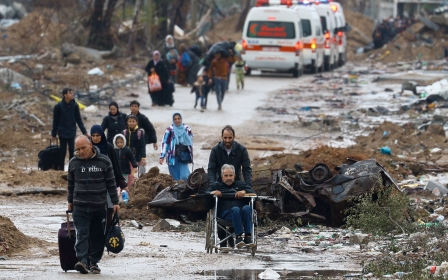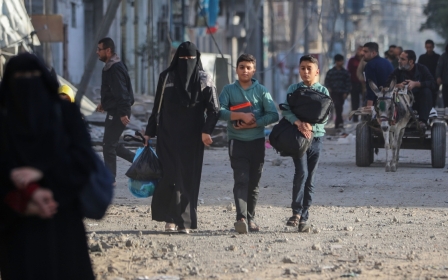Israel-Palestine war: Hackers claim to have targeted Israeli government websites

Hackers have reportedly attacked several Israeli government and media websites in recent weeks, amid Israel's bombing campaign and ground invasion of the besieged Gaza Strip.
A group calling itself Cyber Toufan claimed to have hacked Israel's defence ministry last week and subsequently dumped huge troves of data on its Telegram account, which it claimed were the names of Israeli army and reserve soldiers.
In a video released on its Telegram account, a hacker displayed data he claimed was of Israeli soldiers, including their names, ranks, service numbers and places of residence.
Middle East Eye could not independently verify the names in the leak and Israel's defence ministry did not respond to questions.
Cyber Toufan appears to be a reference to Hamas's 7 October attacks in southern Israel, which Hamas called the Toufan Al-Aqsa, or Al-Aqsa Flood.
New MEE newsletter: Jerusalem Dispatch
Sign up to get the latest insights and analysis on Israel-Palestine, alongside Turkey Unpacked and other MEE newsletters
Cyber Toufan claimed in a statement that it had destroyed more than 1,000 servers in attacks and breached 150 Israeli "targets", including scores of government agencies and companies.
While it's not uncommon for self-styled hacktivists to exaggerate or lie about their successes, on Wednesday, the Israeli newspaper Haaretz reported that hackers had infiltrated Israel's State Archive last week, where they obtained the personal details of the site's users, including researchers, historians and Israeli citizens.
Follow Middle East Eye's live coverage for the latest on the Israel-Palestine war
A notice posted on the state archive website confirmed a cyber attack, but did not mention that the hackers disseminated the details of some of the website's users.
"The company hosting the state archive website has fallen victim to a cyber attack," the notice read.
"The attack disrupts the search and perusal services of the archival material, and we are working to renew full service to the public."
Haaretz reported that the hackers had leaked the names, phone numbers and email addresses of private users, including researchers who had written to the state archive.
Since 7 October, hacking groups who are believed to have links to countries including Iran and Russia have launched a series of cyber attacks against Israel and claimed to have compromised government websites, the Israeli electric grid and a rocket alert app.
At least one Israeli newspaper, The Jerusalem Post, has acknowledged that hackers took down its site temporarily.
Meanwhile, one of the most serious breaches took place just days after the 7 October attacks, when a group calling itself Malek Team hacked Israel's Ono Academic College and stole information about more than 250,000 people.
The group has posted death threats alongside online copies of Israeli citizens' identification documents and footage that appears to be from the school’s internal video surveillance system.
Israel is considered to have some of the most robust cyber defences and is responsible for 10 percent of the world's exports of cyber security tools.
According to figures from the Israeli government, the country's exports of cyber security products topped $11bn in 2022, while arms sales and weapons exports for the same year stood at $12.5bn.
This article is available in French on Middle East Eye French edition.
Middle East Eye delivers independent and unrivalled coverage and analysis of the Middle East, North Africa and beyond. To learn more about republishing this content and the associated fees, please fill out this form. More about MEE can be found here.





